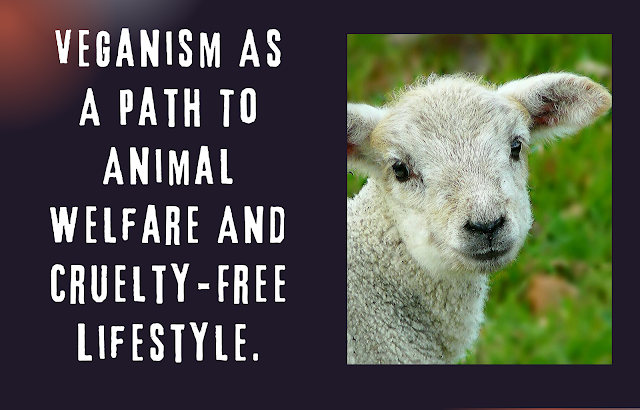Introduction:
In recent years, the world has witnessed a significant shift towards conscious living, marked by a growing concern for animal welfare. Veganism, a lifestyle that abstains from using animal products, has gained remarkable traction as a powerful means to promote the well-being of animals.
In this article, we will delve into the concept of veganism, explore its ethical foundations, and highlight the profound impact it can have on animal welfare.
Read also: Vegan Recipe: Vegan Butternut Squash Wellington - A Culinary Masterpiece Worth Savoring.
Ethical Foundations Of Veganism And The Impact On Animal Welfare:
Understanding Veganism:
At its core, veganism is a philosophy and lifestyle that seeks to avoid the use of animal products for food, clothing, or any other purpose. Veganism encompasses a deep respect for all living beings and acknowledges the inherent value of animals.
By adopting a vegan lifestyle, individuals strive to minimize the exploitation and suffering of animals, recognizing that they have the right to live free from harm.
Ethical Foundations of Veganism:
Veganism is rooted in the belief that all animals possess intrinsic value and deserve to be treated with compassion. Traditional animal agriculture practices, such as factory farming, involve immense suffering and disregard for the welfare of animals.
By abstaining from animal products, vegans aim to combat this cruelty and promote a more ethical relationship with the animal kingdom.
Read also: Quinoa Salad: A Healthy Vegan Food And The Reason It's The Kings Food.
Animal Welfare Benefits of Veganism:
1. Ending Animal Exploitation: Veganism tackles the demand for animal products, which in turn reduces the number of animals bred, confined, and subjected to inhumane conditions. By refusing to support industries that exploit animals, vegans contribute to a significant decrease in animal suffering.
2. Environmental Impact: Animal agriculture is a major contributor to greenhouse gas emissions, deforestation, and water pollution. By adopting a plant-based diet, vegans significantly reduce their carbon footprint, conserving natural resources and supporting a more sustainable planet for both humans and animals.
3. Preservation of Biodiversity: Animal agriculture is often associated with habitat destruction and species loss. By choosing plant-based alternatives, vegans help protect natural ecosystems and the myriad of species that depend on them.
4. Promoting Compassion and Empathy: Veganism fosters a mindset of compassion and empathy towards animals. By consciously making choices that align with these values, vegans inspire others to reconsider their relationship with animals and encourage positive change in society.
Read also: 10 Sustainable Vegan Habits to Adopt from My Vegan Journey.
Transitioning to a Cruelty-Free Lifestyle:
Transitioning to a vegan lifestyle can seem daunting at first, but it can be a rewarding journey filled with personal growth and a sense of purpose. Here are a few steps to help you embark on this path:
1. Education and Awareness: Start by educating yourself about the animal agriculture industry, animal rights, and the benefits of veganism. Familiarize yourself with plant-based alternatives and nutritious vegan recipes to ensure a well-balanced diet.
2. Gradual Changes: Transitioning to veganism doesn't have to be abrupt. Begin by eliminating one animal product at a time, gradually replacing them with cruelty-free alternatives. This approach allows for a smoother transition and helps you adjust to new flavors and ingredients.
3. Community Support: Seek support from like-minded individuals or join local vegan groups. Engaging with a community of vegans can provide guidance, encouragement, and the opportunity to share experiences and resources.
4. Ethical Consumerism: Extend your vegan principles beyond your plate by choosing cruelty-free alternatives for clothing, cosmetics, and household products. Look for certifications such as "vegan" or "cruelty-free" to ensure that no animals were harmed in the production process.
Read also: Finding Harmony Between True Path Yoga and Veganism: A Holistic Approach to Mind, Body, and Diet.
Conclusion:
Veganism offers a powerful and practical solution for promoting animal welfare.
By embracing a cruelty-free lifestyle, individuals can actively contribute to ending animal exploitation, reducing environmental degradation, and fostering a more compassionate society.
The path to veganism may require effort and adjustment, but the rewards in terms of personal satisfaction and the well-being of animals are immeasurable. Let us take a step towards a kinder world by embracing veganism as a transformative force for animal welfare.
Read also: Plant-Powered Perfection: Over 150 Delicious and Nutritious Vegan Recipes for Every Meal.
Read also: Plant-Based Protein: High Protein Vegan Meals to Keep You Strong, Satisfied, and Youthful.




.png)














0 Comments